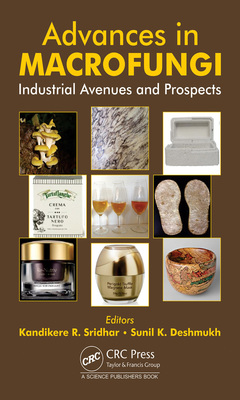Description
Advances in Macrofungi
Industrial Avenues and Prospects
Progress in Mycological Research Series
Coordinators: Sridhar Kandikere R., Deshmukh Sunil K.
Language: English
Subjects for Advances in Macrofungi:
Keywords
Fruit Bodies; White rot fungi; Lentinula Edodes; Unsaturated fatty acids; Therapeutic applications; LiP; Termite mounds; MnP; Pigments; Volvariella Volvacea; Nutraceuticals; Ganoderma Lucidum; Metabolites; Flammulina Velutipes; Lignocellulose; Agaricus Bisporus; Immune stimulation; Solid State Fermentation; Functional foods; Spent Mushroom Substrate; Fermentation; Truffle Species; Edible mushrooms; Ligninolytic Enzymes; Carotenoids; Moisture Content; Carbohydrate polymers; Macrofungal Species; Antioxidant potential; Shiitake; Agrowastes; Medicinal Mushrooms; Pycnoporus Sanguineus; Oyster Mushroom; Genera Cortinarius; Cortinarius; Laetiporus Sulphureus; Button Mushroom; Fomes Fomentarius; Inonotus Obliquus
Publication date: 09-2023
· 15.6x23.4 cm · Paperback
Publication date: 09-2021
· 15.6x23.4 cm · Hardback
Description
/li>Contents
/li>Biography
/li>
Large scale cultivation of macrofungi is possible with fermentation, using easily accessible lignocellulosic agricultural residues applying economical methods to generate substantial biomass, food and biofuels. Bioconversion of lignocellulosic wastes by macrofungi generates value-added fungal nutritional biomass for humans and livestock. Besides commercial cultivation techniques, other topics covered in Advances in Macrofungi: Industrial Avenues and Prospects include: the healing potential of mushrooms, industrial opportunities, mycelium-based products, forest wild mushrooms and industrial applications of white rot fungi.
This book reviews the industrial applications and uses of macrofungi. It encourages students and researchers to explore non-conventional sources of nutrition as well as bioactive metabolites to serve as nutraceuticals. It emphasizes the potential of macrofungi as a source of bioactive compounds to remedy human lifestyle diseases especially cancers and cardiovascular ailments along with immunostimulation potential by Cordyceps. This book emphasizes the role of on mushrooms as a source of cosmeceuticals, flavors, essence, scents and perfumes.
1. Past, Present and Future of Macrofungal Applications: Old Friends, Yet Unknown Strangers CULTIVATION AND MARKET 2. Commercial Cultivation Techniques of Mushrooms 3. Mushroom Market in Malaysia INDUSTRIAL APPLICATIONS 4. Bioprospecting Macrofungi for Biotechnological and Biomedical Applications 5. Infrequent Current and Potential Applications of Mushrooms 6. Industrial Applications of Truffles and Truffle-like Fungi 7. Industrial and Biotechnological Applications of Pleurotus 8. Macrofungi in the Production of Alcoholic Beverages: Beer, Wine, and Spirits 9. Biochemical Profile of Six Wild Edible Mushrooms of the Western Ghats 10. Truffles: A Potential Source of Bioactive Compounds ENZYMES 11. Potential Biotechnological Applications of Enzymes from Macrofungi 12. Enzymes of White Rot Fungi and their Industrial Potential PIGMENTS 13. Industrial Applications of Pigments from Macrofungi 14. Colourful Macrofungi and their Pigment Structures 15. Insights on the Structural and Functional Attributes of Melanin from Termitophilic Agaricales BIOREMEDIATION 16. Macrofungal Mycelia as Sources of Biopesticides
Kandikere R. Sridhar is an adjunct faculty member at Mangalore and Yenepoya Universities, India. His main areas of research are Diversity and Ecology of Fungi of the Western Ghats and Marine Habitats. He was NSERC postdoctoral fellow/visiting professor at: Mount Allison University, Canada; Helmholtz Centre for Environmental Research-UFZ and Martin Luther University, Germany; Centre of Biology, University of Minho, Portugal. He is a Distinguished Asian Mycologist and Outstanding Leader in Education and Research at the Association of Agricultural Technology, Southeast Asia. He is placed in the world's top 2% of scientists in mycology.
Sunil K. Deshmukh is a veteran industrial mycologist who has spent a significant part of his career at Hoechst Marion Roussel Limited, Mumbai and Piramal Enterprises Limited, Mumbai. He has also served as Fellow at Nano-Biotechnology Centre, TERI, New Delhi and Adjunct Associate Professor at Deakin University, Australia. He is a fellow of the Mycological Society of India (MSI), the Association of Biotechnology and Pharmacy, the Scoiety for Applied Biotechnology and the Maharashtra Academy of Science. He was the past President of the Mycological Society of India (2017). He has over 120 publications, 8 patents and has edited 10 books.




